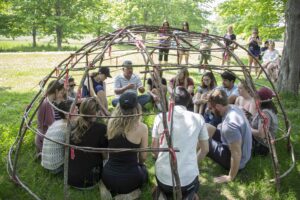Section 1 : Eastern Door ~ The Rising Sun
Course Information
Let us begin by examining the course description, learning objectives, and sessions that comprise IKE 1040: Indigenous Teachings of Turtle Island. Instructors may introduce their own material, content and approaches to the course, as is expected; yet, I trust what has been developed can be of assistance.
Course Description
This course is an introduction to the various Nations on Turtle Island. It will be a combination of classroom and culturally-based learning. Anchored in L’nu (Mi’kmaq) knowledge, students will learn about ceremony, protocol, Elders and traditional teachers. In turn, these will help foster a mental, physical, emotional and spiritual understanding of Indigenous worldviews and ways of knowing. This course also introduces Canada’s history of genocide and cultural assimilation imposed upon Indigenous Peoples. It will discuss why anyone living in Canada needs to know this history.
Learning Objectives
The overall goal of this course is to deepen a student’s (future leaders) understanding about Indigenous peoples, their knowledge systems, histories, cultures, traditions, and resiliencies within the context prolonged and devastating colonial policies and practices that has led to Calls to Action so healing, truth and reconciliation can be realized. All UPEI students will require this course to be conferred a degree, and is vital to all relations of Turtle Island. Specific student learning outcomes include:
1. To understand (through lectures, supplemental material and independent research) key terms and concepts relating to Indigenous knowledges, worldviews, protocols and ways of knowing;
2. To understand significance and meaning of Indigenous practices relating to ceremony and relationships;
3. To understand and explain important Indigenous and non-Indigenous relations historically and in contemporary society;
4. To critically analyze and understand impacts of colonialism and cultural assimilation policies and practices including trauma and inter-generational trauma;
5. To understand major issues emanating from assimilation and genocidal practices;
6. To understand Indigenous peoples’ histories and pathways to healing and reclamation of culture; and
7. To critically analyze and understand one’s own role in reconciliation and TRC’s Calls to Action.
Sessions (Chapters) at a Glance
- Session 1: Welcome and Traditional Opening of Circle
- Session 2: What are Teachings ~ What is Turtle Island ~ Who are the Mi’kmaq Peoples?
- Session 3: Cultural Practices and Indigenous Ways of Knowing and Being ~ Terms, Identity and Meaning
- Session 4: History of Indigenous Peoples in Canada, United States, Mexico, and the Caribbean
- Session 5: Mi’kmaq Historians ~ Mi’kmaq Social Values and Economy ~ Treaties ~ Royal Proclamation Act ~ Indian Act
- Session 6: Colonialism ~ Colonization Practices ~ Indian Residential Schools ~ Genocide
- Session 7: Trauma and Intergenerational Trauma ~ Traditional Healing ~ Contemporary Health and Wellness
- Session 8: Land Dispossession ~ Systemic Racism ~ Right to Self-Determination
- Session 9: Indigenous Resilience ~ Reclamation ~ Resistance
- Session 10: Indigenous peoples in the 21st Century
- Session 11: Truth and Reconciliation ~ Calls to Action ~ Responsible Citizenship
- Session 12: Honouring Msit No’kmaq ~ Wahkohtowin ~ All our Relations and Closing of Circle
Let the Learning Begin

